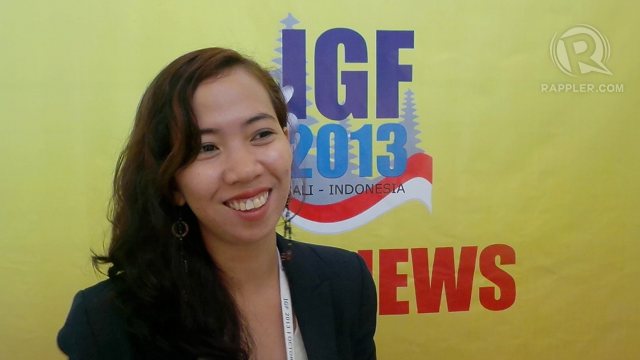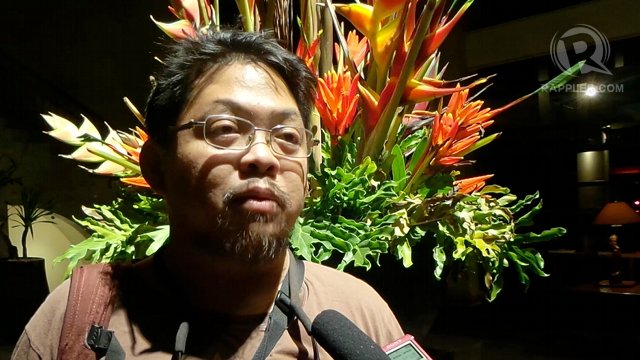SUMMARY
This is AI generated summarization, which may have errors. For context, always refer to the full article.

BALI, Indonesia – Filipino netizens successfully campaigned to stop the implementation of the anti-cybercrime law, but what next?
Filipino delegates to a global Internet forum actively participated in discussions on the future of the Internet, emphasizing that there is more work to be done to maintain the Philippines’ record of having one of the freest Internet in the world.
Nica Dumlao of the Foundation for Media Alternatives (FMA) and blogger Juned Sonido of Democracy.Net.PH represented Philippine civil society in the United Nations’ 8th Internet Governance Forum (IGF) held here from October 22 to 25. FMA belongs to the steering committee of the Philippine Internet Freedom Alliance. Sonido was part of the delegation of Freedom House, a US-based non-governmental organization dedicated to promoting free institutions worldwide.
The IGF is the leading forum for government representatives, business groups, civil society organizations and tech experts to discuss public policy issues related to the Internet. Over 2,000 delegates from all over the world attended this year’s IGF.
While the pushback against the cybercrime law was cited as a best practice, Dumlao and Sonido said the challenge for Filipino netizens is to fight other ambiguous laws, and to raise awareness about alternative bills. They also called on the Philippine government to participate in the IGF as there was no official representative.
Sonido’s group is pushing for the passage of the Magna Carta for Philippine Internet Freedom (MCPIF), a crowdsourced bill that aims to replace the anti-cybercrime law and establish a framework for ICT in the Philippines.
Rappler talked to Dumlao and Sonido about their IGF experience and what the Philippines can learn from the global Internet context and vice versa. Here is our interview:
What were the key points you learned from the IGF workshops and discussions?
Dumlao: I realized that there are many countries experiencing the same thing as the Philippines. Within Southeast Asia, there are many countries trying to enact a cybercrime law, which as what we experienced has very vague and overbroad provisions without trying to recognize rights. More countries are experiencing filtering, surveillance.
What we tried to share here are the experiences in the Philippines, how we blocked the cybercrime law, and how we try to forward the positive rights approach where before you restrict the rights of the users online, you should also recognize that our human rights offline are also our human rights online. Even the business sector is recognizing the fact that you have rights online and it should be protected. The problem is how are they protecting it.
Sonido: There were a lot of issues, most of us know that from cyberbullying to cybersecurity but overall what I gleaned from it is you can actually apply such things but it has to be balanced out with human rights, the law and everything that’s applied should pass through a fair process.
In other words, you cannot just jail someone, you cannot just put down a site, block down a site without due process, going through the courts. Otherwise, authorities or someone may just abuse it. We don’t want abuse on either side.
There is a need for laws but the laws have to be tempered because in other countries, the laws are used to stifle freedom of expression. I’m not just saying it’s only freedom of expression but we must balance it also with the other rights and we can do this through a process of law, due process.

Where do you situate the Philippines in the global discussion on net freedom?
Dumlao: I believe the Philippines has a somewhat wide space for Internet freedom but what we should stress is even though you’re enjoying this space, you have to protect it. As for the Philippine Internet Freedom Alliance, the network of Internet activists in the Philippines, we tried to stop the cybercrime law. We try to mainstream, keep the conversation going.
This is a good venue to tell people that even if you have Internet freedom in your country like in the US, there are other challenges you have to face. You can’t really enjoy that much Internet freedom if you have surveillance.
We need help in how to further the discourse. Yes, we know we have rights but there are other frameworks they are using here like this software vulnerability protection, so there are other terms here we can learn from that we can try to study so that it can help in protecting Internet freedom.
Sonido: We are in a sense partly threatened because we have ambiguous laws. We need to fix that so the rule of law should apply even on the Internet. Civil and political rights offline should be applied online.
Otherwise, we may be suffering from what’s happening in other places. Bloggers are jailed for blasphemy, and they’re killed in other countries so there is a need for us to put it in our Constitution, our laws. That is very important.
What inputs did you get about pushing for bills like the MCPIF?
Sonido: There is a need to discuss the MCPIF in all its aspects: political and civil rights, the quest for universal digital access, how to secure our infrastructure so we can have a safe, secure and free Internet.
It’s really important we engage and we’re not limited to the lobbying but we also have to go to the people because let’s face it, the Internet is slowly becoming ubiquitous. When we go to get our birth certificate, we have to go online. Most of our infrastructure is tied to the Internet. We express our opinion on the net. Government interacts on the net so it’s very important to safeguard this.
We do this through discussion, education and legislative push. Education means it’s not only for the kids but everyone involved online: young, old, government official, housewife. – Rappler.com
Add a comment
How does this make you feel?
There are no comments yet. Add your comment to start the conversation.